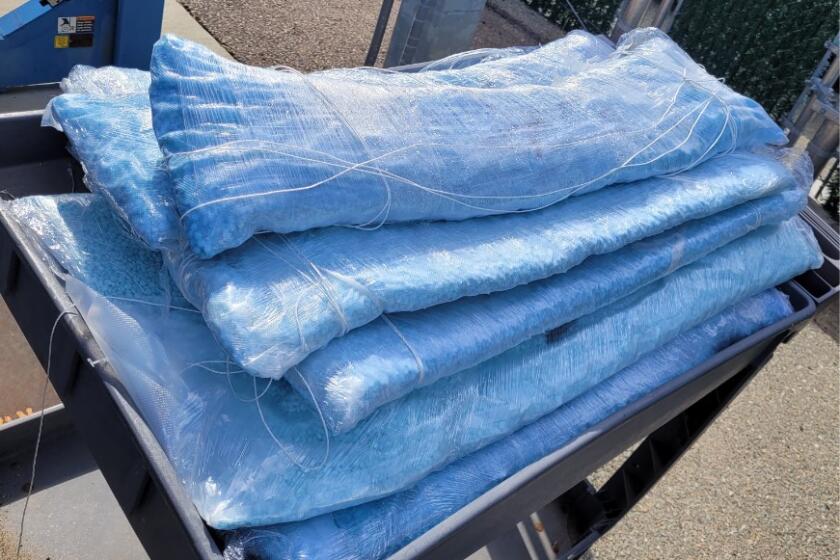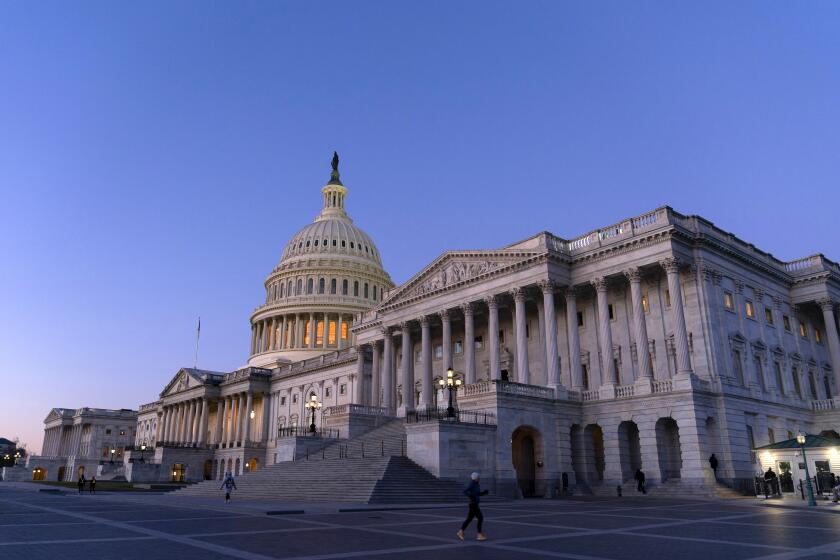Orange County congressional candidate Scott Baugh’s new ad talks about his brother’s death from fentanyl

- Share via
The camera pans over framed photographs of five little boys with crew cuts, wide smiles and button-down shirts, as Orange County congressional candidate Scott Baugh says: “There were five brothers. One had his struggles. I miss him, every day.”
“Addiction doesn’t care if you’re Republican or Democrat,” Baugh says. “It’s a disease affecting millions, and it’s personal for me.”
The advertisement, which begins airing Wednesday, marks the first time that Baugh, 62, has publicly discussed his younger brother’s death from fentanyl in 2020. He said his first priority in Congress will be addressing the fentanyl epidemic.
The advertisement brings a deeply personal tone to the fraught race for coastal Orange County’s 47th Congressional District. The seat is one of a handful across the U.S. seen as pivotal in determining which party controls the House of Representatives after the November election.
Rep. Katie Porter (D-Irvine) launched a bid for the U.S. Senate instead of seeking re-election to the House, losing in the primary, so the district has no incumbent candidate. Baugh, a former chair of the Orange County GOP, lost to Porter by 3.4 percentage points in the 2022 midterms. He will face state Sen. Dave Min (D-Irvine) in November.
Seizures of fentanyl smuggled into California have dramatically surged over the last few years, according to officials.
In an interview, Baugh struggled to maintain his composure as he talked about his younger brother, Randy. He said he was a gregarious guy who loved to cook for friends and strangers and often baked chocolate chip cookies on Saturday nights.
“He was the guy who’d literally give you the shirt off his back if you needed it, whether he needed it or not,” Baugh said. “He had a servant’s heart.”
After back surgery about a decade ago, Randy developed an addiction to prescription painkillers, Baugh said. The family tried to help for years, he said, including sending him to drug rehabilitation programs twice.
In the spring of 2020, Randy’s adult children found him unconscious at home in Orange County. He died at 56.
Addiction is “sort of an abstract issue, until you see someone’s life devastated by it,” Baugh said. “You recognize that this isn’t a situation where you can just tell somebody to just snap out of it. It’s not a situation where you can tell somebody to pull themselves up by their own bootstraps. In most of these cases, they don’t have that ability.”
Nearly 75,000 Americans, including 6,850 Californians, died of fentanyl overdoses last year, according to federal and state health officials.
Fentanyl has become an election issue, used primarily by Republicans to criticize the Biden administration and Democrats for not doing more to stem illegal immigration and secure the border.
But only a handful of politicians have made the human tragedy of the opioid crisis a campaign issue, and even fewer have talked about losing a loved one to an overdose.
North Carolina Atty. Gen. Josh Stein, a Democrat who is running for governor, released an ad this summer featuring a grieving mother whose son died of a fentanyl overdose. And in a crucial Senate race in Pennsylvania, Republican Dave McCormick recently criticized incumbent Sen. Bob Casey for failing to address the crisis in an ad that quoted a local sheriff whose son fatally overdosed in 2020.
At the urging of former President Trump, Senate Republicans this year blocked a bipartisan deal that would have directed about $20 billion to additional enforcement on the U.S.-Mexico border, including to combat drug trafficking.
Senate Republicans have blocked a bipartisan border package, scuttling months of negotiation on the legislation.
During last week’s presidential debate, Vice President Kamala Harris blamed Trump for putting political gain ahead of the well-being of Americans, saying “he’d prefer to run on a problem instead of fixing a problem.”
Data from the U.S. Border Patrol show that about 90% of the fentanyl seized at the border in recent years was at legal points of entry, and 91% of the seizures were from U.S. citizens.
That includes roughly 62,000 pounds of fentanyl smuggled into California last year and seized by law enforcement, which Gov. Gavin Newsom described as “enough to potentially kill the global population nearly twice over.”
Those statistics don’t reflect drugs that are moving across the border without being seized, Baugh said.
Baugh said that in Congress he would address the fentanyl crisis by trying to stop the flow of drugs across the U.S.-Mexico border.
“We need robust immigration, but we need to know who’s coming in and what they’re bringing with them,” Baugh said. “We need to make sure that fentanyl, which is particularly a poison, stays out of our country.”
After his brother’s death, Baugh became a founding board member at a nonprofit in Orange County called Fentanyl Solution. The organization distributes naloxone, sometimes known by the brand names Narcan or Kloxxado — a nasal spray that can halt a deadly opioid overdose if administered promptly — and trains people on how to use it.
Santa Ana resident Shane Wood, the executive director of the nonprofit, said Baugh helped connect the group to CalOptima, which administers health insurance plans for low-income residents in Orange County, to help distribute tens of thousands of extra doses of naloxone.
Wood credited Baugh with breaking the stigma of talking about deaths from fentanyl, a topic he says comes up often behind closed doors. He said the organization, which is a nonprofit, will not endorse a candidate in the congressional race.
He said he hopes that Min or Baugh will be an advocate in Congress for “comprehensive recovery and mental health recovery services.”
He said he also hopes Baugh or Min will pressure local governments to spend the money they’ve already received for opioid abatement, to help get more doses of naloxone into the hands of people who will use it.
Baugh said he would consider supporting House bills that address addiction issues, in part because addiction is so closely connected to California’s problems with homelessness. But, he said: “We’ve got to be careful when the federal government comes in with a one-size-fits-all solution. ... You need some accountability structures to make sure that the dollars are going to the right places, the right people and being spent efficiently.”
More to Read
Get the L.A. Times Politics newsletter
Deeply reported insights into legislation, politics and policy from Sacramento, Washington and beyond. In your inbox twice per week.
You may occasionally receive promotional content from the Los Angeles Times.













